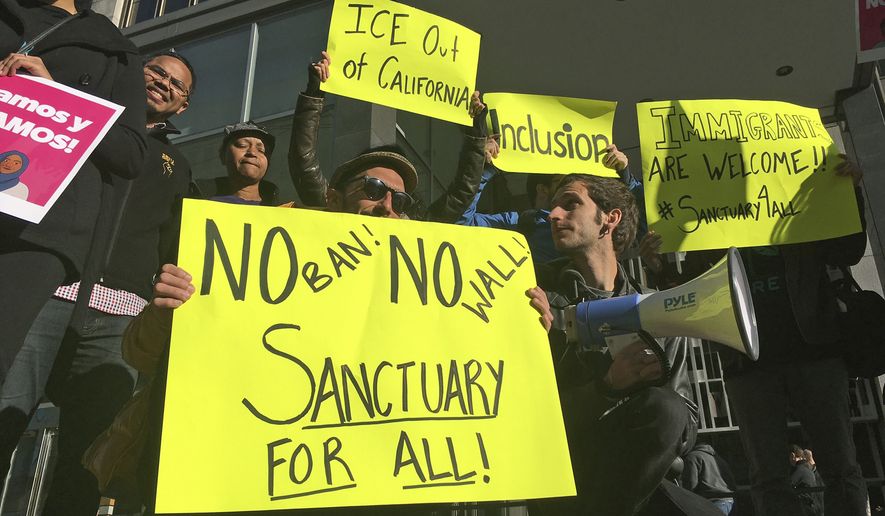The Justice Department issued a final warning this week to five jurisdictions it accuses of having “sanctuary” policies protecting illegal immigrants, giving them until Oct. 27 to prove they are complying with federal law or else risk losing millions of dollars in federal grants.
Philadelphia, New York City, New Orleans, Chicago and surrounding Cook County, Illinois, were all put on notice that their policies don’t appear to comply with federal law that conditions certain public safety grant money on the requirement that localities don’t restrict information sharing with federal deportation agents.
Some of the jurisdictions fired back Thursday, saying the administration is trying to bully them into dropping their protections for illegal immigrants.
“It comes as no surprise the Justice Department is not satisfied with our explanation,” said Philadelphia Mayor Jim Kenney. “They won’t be satisfied unless we actively join them in scaring immigrants out of our communities. We are not going to do that.”
The five jurisdictions are part of an initial list of 10 identified by the Obama administration as having policies that could conflict with the information-sharing law.
In the case of Philadelphia, Justice Department officials took issue with policies that include an executive order preventing local officials from giving immigration authorities notice that a person is being released from custody unless the person has been convicted of certain felony offenses. Federal officials also object to a police department policy that bans sharing information about the status of any immigrant who is a victim of a crime.
SEE ALSO: Two ‘Dreamers’ caught smuggling illegal immigrants into U.S.
New York Mayor Bill de Blasio said he believed his city was in full compliance with the law and that the Justice Department should not withhold grant funds from the New York City Police Department.
“The NYPD deserves the anti-terrorism funding they have gotten from the federal government, and if President Trump stops our funding for the NYPD, we will see the president in court,” he said at a press conference Thursday. “It’s as simple as that. We are fully in compliance.”
At stake for the defiant “sanctuary” cities are millions of dollars in public safety grants distributed through the Edward Byrne Memorial Justice Assistance Grant Program that are supposed to go only to jurisdictions that comply with section 1373 of Title 8 of the U.S. Code. The law prohibits policies that restrict communications with federal immigration authorities “regarding the citizenship or immigration status, lawful or unlawful, of any individual.”
Last year, New York received approximately $4.3 million in Byrne grant funds.
Philadelphia and Chicago are among a long list of jurisdictions that have sued the Justice Department to challenge grant conditions that Attorney General Jeff Sessions tried to impose. The jurisdictions say the conditions go beyond federal law.
“I totally 100 percent reject the false choice of Donald Trump and the Justice Department,” Chicago Mayor Rahm Emanuel said on Thursday. “We are not going to be a city that picks between the philosophy of community policing and the principles of being a welcoming city.”
Mr. Sessions has blamed lax immigration enforcement for fostering a culture of lawlessness that he says leads to upticks in crime, and the Justice Department has sought to compel jurisdictions to cooperate with federal authorities as they crack down on illegal immigration.
“Jurisdictions that adopt so-called ’sanctuary policies’ also adopt the view that the protection of criminal aliens is more important than the protection of law-abiding citizens and of the rule of law,” Mr. Sessions said in a statement.
The department said Cook County’s ordinance banning employees from responding to U.S. Immigration and Customs Enforcement inquiries runs afoul of federal law.
“The department has determined that this section prohibits the Sheriff of Cook County from honoring a request from ICE seeking advance notice before Cook County releases an alien,” Justice Department officials wrote.
Cook County spokesman Frank Shuftan said the county maintains it is in compliance with federal laws and is evaluating how to respond.
New Orleans was warned that a police department regulation could violate federal immigration law depending on whether officers interpreted the policy as restricting them “from requesting information regarding immigration status from federal immigration officers.”
Mayor Mitch Landrieu responded by clarifying that New Orleans never interpreted the policy as having that effect and went on to declare that he believed the city had been exonerated by the Justice Department.
“Under my administration, the New Orleans Police Department has and will continue to follow all federal laws; however, the NOPD will not be the federal government’s deportation force,” Mr. Landrieu said.
Four other jurisdictions that were part of the original 10 targets have been told their policies don’t conflict with the law. They are Milwaukee County, Wisconsin; the state of Connecticut; Clark County, Nevada; and Miami-Dade County.
The California Board of State and Community Corrections was also one of the 10 targeted jurisdictions, but it wasn’t cleared, nor was it subjected to a follow-up letter this week.
A Justice Department spokesman declined to comment on California’s status.
Board spokeswoman Tracie Cone said officials “have no idea why we haven’t heard back.”
But the state earlier this month enacted a “sanctuary” law that severely limits cooperation between ICE and local law enforcement agencies, prompting the director of ICE to say he will have to send officers into communities more frequently now to arrest criminal illegal immigrants released by local authorities.
• Andrea Noble can be reached at anoble@washingtontimes.com.




Please read our comment policy before commenting.